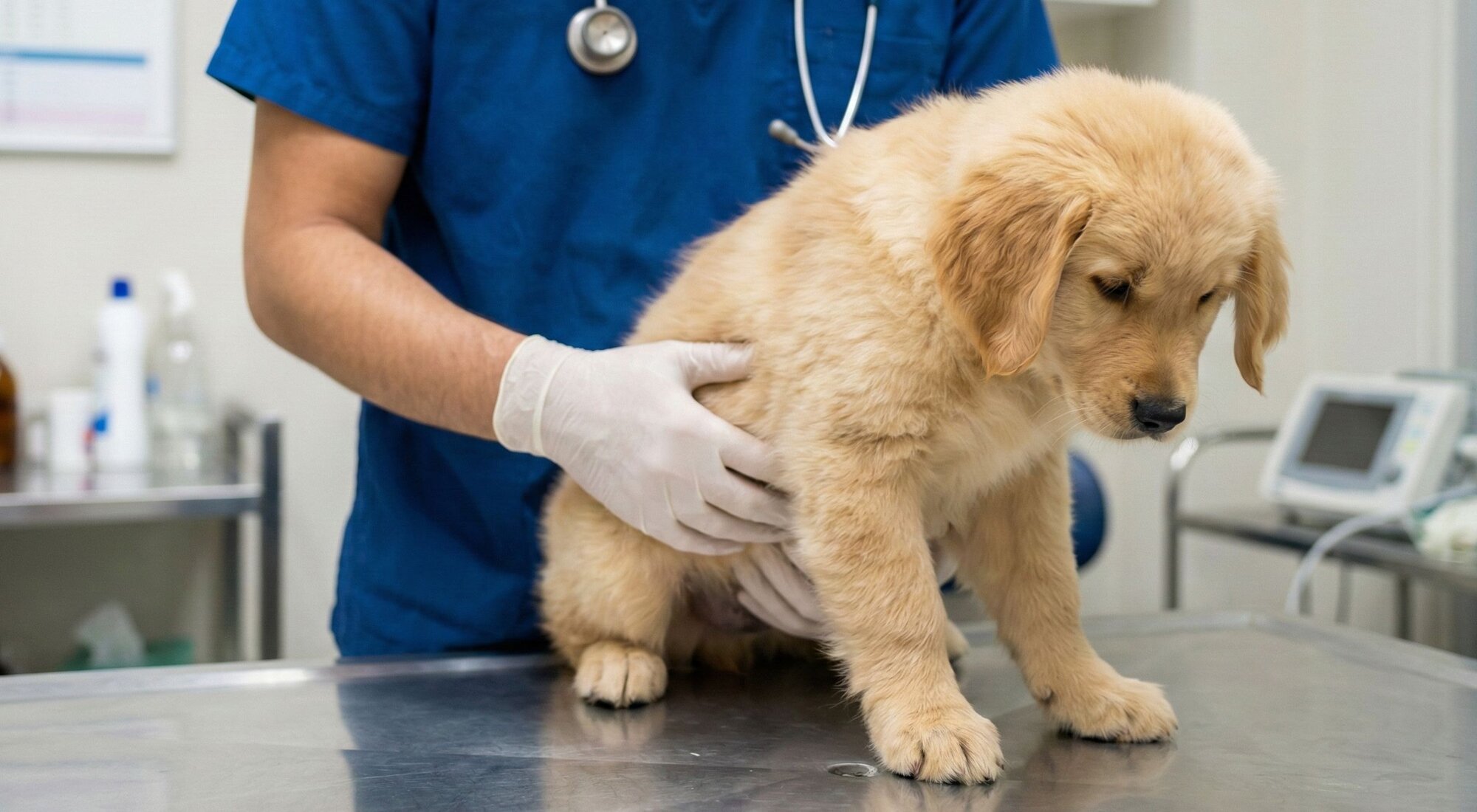Last Updated: 03/02/2026
What to Do if your Puppy is Sick: Signs, and Vet Advice
Is your puppy feeling flat? From tummy upsets to parvovirus, our vets explain how to recognise if your puppy is sick, common illnesses to watch for, and the best ways to provide home care alongside professional veterinary treatment.
Author: Dr Emilee Lay BVSc BSc (Vet) Hons
Reading Time: 11 minutes - short read
Bringing home a new puppy is one of life's greatest highlights, but it also comes with a big learning curve - especially when it comes to their health. Because puppies have developing immune systems, they can go from "playful" to "poorly" quite quickly. Recognising the early, often subtle signs of illness is one of the most important skills a new pet parent can have. This guide covers the common red flags to look for, the most frequent puppy health concerns in Australia, and how to provide the best care to get that tail wagging again.
Recognising signs of illness

It’s all fun and games when there's a puppy around the house, but it's important to know what signs to look out for when they might be unwell. They can be very subtle - to overtly obvious.
Signs of possible disease include:
- Lethargy
- Loss of appetite
- Nausea and Vomiting Diarrhoea (especially if with blood of mucous)
- Excessive Panting
- Whimpering Limping/Lameness
- Sudden Aggression
- Excessive Licking or Scratching
If you notice any of the above signs, contact your local vet. Make a note of how long your puppy has been showing signs. If your puppy is displaying abnormal behaviours - recording a video can be handy to show your vet. Photos of vomitus or diarrhoea can also be helpful.
Knowing what's normal for your puppy is also essential. Daily checks at home can help you pick up the more subtle or early signs of disease. These checks can include asking and checking:
- Is your pup's demeanour bright and alert?
- What is your pup's normal appetite?
- Run your hands through their coat, and check for any scratches, lumps, bumps or parasites.
- Are their eyes bright and clear of any discharge, are they squinting or pawing at them?
- Are they head shaking or scratching excessively at their ears?
- Are there any discharge or abnormal odours from their ears? Are they limping or lame?
Being vigilant at home is key, as puppies cannot always effectively communicate when something is wrong. Check out our New Puppy Guide for everything you need to know when it comes to caring for your puppy.
Common puppy illnesses

Visit your vet immediately

It is essential not to delay seeking veterinary care for your puppy. Veterinarians can examine, diagnose, and provide appropriate triage and treatment plans for your puppy. In an emergency it's easy to panic - but make sure to take a big breath and focus on the essentials. Make sure you have an appropriate dog carrier to transport your puppy in.
Your veterinarian will be able to guide you through the process and discuss all the options for your puppy. Remember to be kind to your veterinarians, even when stressed, a little kindness can go a long way. With the additional pressures on the industry due to a shortage of veterinarians and an increased demand for veterinary services - many clinics are booked out well in advance.
Make sure to have a list of clinics and their contact details on hand. Knowing where your closest Veterinary Emergency Centres are - is also important - especially for those out-of-hours situations.
Get a professional diagnosis and treatment plan
With the internet at our fingertips, it can be tempting to go down the rabbit hole that is Dr. Google. Asking for advice online can help provide reassurance, especially in times of stress. What is important to remember is that consulting a vet who can physically examine your pet, assess their health, and provide their expert opinion on treatment options is always the way to go.
Early intervention and appropriate professional care greatly contribute to a puppy’s recovery. At-home or over-the-counter remedies can delay essential treatment and in some instances worsen the prognosis. If finances are a concern, some clinics offer buy now pay later services such as payment plans through third-party companies.
Caring for a sick puppy

It can be quite distressing when your puppy is unwell. It is important to note that even after a vet visit, your puppy may take some time to improve. Patience and dedication are key! Puppies are a long-term commitment even more so when they are unwell - being understanding about what they can and can’t feasibly do during this time is a must.
Know what's normal
Knowing whats normal behaviour for your puppy and what their personality is like can help you identify alterations in appetite, mood and energy levels - all of which can assist in your vet making a diagnosis.
Create an area to rest
Make sure to provide an area where your puppy can rest easily - away from too much noise and distractions. Much like a little den - a dog crate can be a great place for them to recuperate.
Bland diet
Bland diets are sometimes all a dog can stomach when they are sick. Boiled chicken (without the skin) or tuna in springwater with rice made into a porridge can help keep their energy levels up and well hydrated. Do not force-feed or syringe feed your puppy as they may aspirate or vomit. If they are unable to keep food or water down without vomiting - this requires an immediate vet visit.
If you have a newborn puppy - check out our guide to caring for a newborn puppy for more information.
Maintain a calm environment
It can be easy to spiral when your puppy is unwell. Remember to take a moment to collect yourself, breathe and come up with a game plan. Being anxious can sometimes also stress your puppy out more. So remaining calm will also benefit them.
Being calm also extends to your pup. Avoid outings, playdates, or puppy school until your puppy is feeling better. Ensure they are kept in a nice quiet place so that they can recuperate.
In Summary
After you’ve had a breather its important to get started on your game plan!
- Record the abnormal signs your puppy is showing and when they started.
- Ask yourself: are they still eating and drinking normally? What is their demeanour?
- Call your local veterinarian or emergency centre to book an appointment
- Monitor your puppy closely, keep them in a warm and calm environment. If they aren’t eating as much offer bland foods in small amounts.
Check out our handy Pet First Aid Tips Guide for more information!
Preventative measures

Many common debilitating diseases that puppies can acquire are easily preventable with appropriate vaccinations and parasite prevention.
Vaccinations
Puppies usually have at least one vaccination prior to being rehomed. Make sure to double-check when their next vaccine is due and book an appointment with your vet. Some clinics offer puppy health checks as well - and these are a great way to make sure you’re on the right track.
Learn more in our Puppy Vaccination Guide.
Parasite prevention
As mentioned before puppies should be wormed every two weeks until they are 12 weeks of age. Flea and Tick Prevention can be started from 6-8 weeks of age. Reweigh your puppy before each dose, as they may outgrow the pack you have at home. Make sure to double-check when their next flea, tick and wormer is due and put a reminder in your calendar or diary.
Learn more in our Puppy Care Guide and Worms in Dogs.
FAQs
Caring for a sick puppy can be a stressful experience, but being prepared with a solid game plan makes all the difference. By staying vigilant with daily health checks, keeping up to date with vaccinations, and acting quickly when something feels "off," the best possible outcome for a growing dog is ensured. Remember, when in doubt, a quick call to a veterinarian is always the safest move for a puppy’s long-term health and happiness.
Articles recommended for you
Our vet authored guide to the benefits of feeding your dog fresh food plus tips and advice for introducing it into their regular menu.
See our guide to protecting your pet from parasites from our vet team.
Thinking of getting a fish? Check out our guide for setting up a tank and home care tips!
Looking to understand horse feeds better? This comprehensive guide covers feeding recommendations for horses of all ages and disciplines.
Does your pet suffer from anxiety? Check out our Vet-guide for treatment options to help your pet.
History
Our experts continually monitor the health and wellness space and we update our articles when new information becomes available.
Wed 4 Feb 2026
Edited by Dr Gillian Hill BVSc (Hons)Dr Emilee Lay BVSc BSc (Vet) Hons
Veterinarian
Dr. Emilee graduated from the University of Sydney in 2018 with a Bachelor of Veterinary Science and Bachelor of Science (Veterinary Studies) and as a student worked for a number of years as a small animals and exotics nurse in clinics across Sydney. She is currently a practicing small animal and exotic vet along the Coast. Emilee holds a special passion for avian and exotic medicine (bunnies being her favourite patients), as well as animal behavioural medicine!

